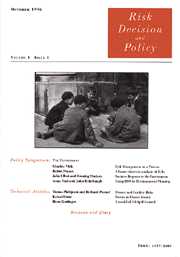Crossref Citations
This article has been cited by the following publications. This list is generated based on data provided by
Crossref.
Lipkus, Isaac M.
Klein, William M. P.
Skinner, Celette Sugg
and
Rimer, Barbara K.
2005.
Breast cancer risk perceptions and breast cancer worry: what predicts what?.
Journal of Risk Research,
Vol. 8,
Issue. 5,
p.
439.
Gurmankin, Andrea D.
Helweg-Larsen, Marie
Armstrong, Katrina
Kimmel, Stephen E.
and
Volpp, Kevin G. M.
2005.
Comparing the Standard Rating Scale and the Magnifier Scale for Assessing Risk Perceptions.
Medical Decision Making,
Vol. 25,
Issue. 5,
p.
560.
Zajac, Laura E.
Klein, William M. P.
and
McCaul, Kevin D.
2006.
Absolute and Comparative Risk Perceptions as Predictors of Cancer Worry: Moderating Effects of Gender and Psychological Distress.
Journal of Health Communication,
Vol. 11,
Issue. sup001,
p.
37.
Klein, William M. P.
and
Cerully, Jennifer L.
2007.
Health‐Related Risk Perception and Decision‐Making: Lessons from the Study of Motives in Social Psychology.
Social and Personality Psychology Compass,
Vol. 1,
Issue. 1,
p.
334.
Klein, William
Geaghan, Thomas
and
MacDonald, Tara
2007.
Unplanned Sexual Activity as a Consequence of Alcohol Use: A Prospective Study of Risk Perceptions and Alcohol Use Among College Freshmen.
Journal of American College Health,
Vol. 56,
Issue. 3,
p.
317.
Moore, Don A.
2007.
When good = better than average.
Judgment and Decision Making,
Vol. 2,
Issue. 5,
p.
277.
Rose, Jason P.
Endo, Yumi
Windschitl, Paul D.
and
Suls, Jerry
2008.
Cultural Differences in Unrealistic Optimism and Pessimism: The Role of Egocentrism and Direct Versus Indirect Comparison Measures.
Personality and Social Psychology Bulletin,
Vol. 34,
Issue. 9,
p.
1236.
Glickman, Mark
and
Land, Stephanie R.
2008.
’We all survived’ and other failings of risk perception.
CHANCE,
Vol. 21,
Issue. 4,
p.
51.
Glickman, Mark
and
Land, Stephanie R.
2008.
Here's to Your Health.
CHANCE,
Vol. 21,
Issue. 4,
p.
51.
Asimakopoulou, Koula G.
Skinner, T. Chas
Spimpolo, Jennifer
Marsh, Sally
and
Fox, Charles
2008.
Unrealistic pessimism about risk of coronary heart disease and stroke in patients with type 2 diabetes.
Patient Education and Counseling,
Vol. 71,
Issue. 1,
p.
95.
Wong, Norman
2009.
Investigating the Effects of Cancer Risk and Efficacy Perceptions on Cancer Prevention Adherence and Intentions.
Health Communication,
Vol. 24,
Issue. 2,
p.
95.
Dillard, Amanda J.
Midboe, Amanda M.
and
Klein, William M. P.
2009.
The Dark Side of Optimism: Unrealistic Optimism About Problems With Alcohol Predicts Subsequent Negative Event Experiences.
Personality and Social Psychology Bulletin,
Vol. 35,
Issue. 11,
p.
1540.
Waters, Erika A
Sullivan, Helen W
Nelson, Wendy
and
Hesse, Bradford W
2009.
What Is My Cancer Risk? How Internet-Based Cancer Risk Assessment Tools Communicate Individualized Risk Estimates to the Public: Content Analysis.
Journal of Medical Internet Research,
Vol. 11,
Issue. 3,
p.
e33.
Schmiege, Sarah J.
Klein, William M. P.
and
Bryan, Angela D.
2010.
The effect of peer comparison information in the context of expert recommendations on risk perceptions and subsequent behavior.
European Journal of Social Psychology,
Vol. 40,
Issue. 5,
p.
746.
Phillips, Jennifer E.
and
Klein, William M. P.
2010.
Socioeconomic Status and Coronary Heart Disease Risk: The Role of Social Cognitive Factors.
Social and Personality Psychology Compass,
Vol. 4,
Issue. 9,
p.
704.
Mahler, Heike I. M.
Kulik, James A.
Gerrard, Meg
and
Gibbons, Frederick X.
2010.
Effects of upward and downward social comparison information on the efficacy of an appearance-based sun protection intervention: a randomized, controlled experiment.
Journal of Behavioral Medicine,
Vol. 33,
Issue. 6,
p.
496.
Rose, Jason P.
Suls, Jerry
and
Windschitl, Paul D.
2011.
When and why people are comparatively optimistic about future health risks: The role of direct and indirect comparison measures.
Psychology, Health & Medicine,
Vol. 16,
Issue. 4,
p.
475.
Waters, Erika A.
Klein, William M. P.
Moser, Richard P.
Yu, Mandi
Waldron, William R.
McNeel, Timothy S.
and
Freedman, Andrew N.
2011.
Correlates of unrealistic risk beliefs in a nationally representative sample.
Journal of Behavioral Medicine,
Vol. 34,
Issue. 3,
p.
225.
Dillard, Amanda J.
Ubel, Peter A.
Smith, Dylan M.
Zikmund-Fisher, Brian J.
Nair, Vijay
Derry, Holly A.
Zhang, Aijun
Pitsch, Rosemarie K.
Alford, Sharon Hensley
McClure, Jennifer B.
and
Fagerlin, Angela
2011.
The Distinct Role of Comparative Risk Perceptions in a Breast Cancer Prevention Program.
Annals of Behavioral Medicine,
Vol. 42,
Issue. 2,
p.
262.
Rose, Jason P
2012.
Debiasing comparative optimism and increasing worry for health outcomes.
Journal of Health Psychology,
Vol. 17,
Issue. 8,
p.
1121.


